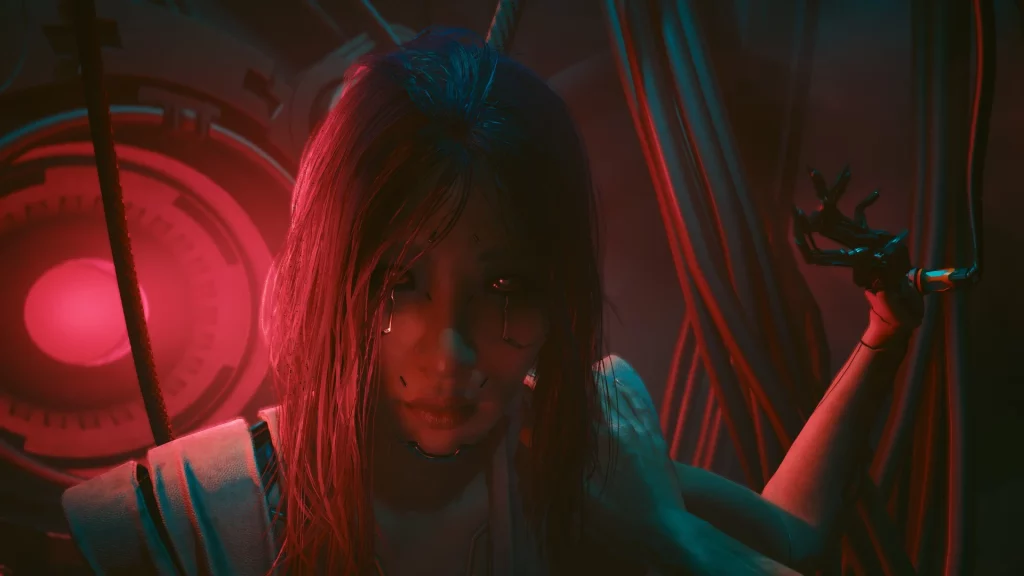
Most DLC content has the advantage of knowing exactly what worked in a game’s original release, allowing developers to springboard off of the existing universe and mechanics without having to start at square one. Minutes into the Phantom Liberty expansion, it becomes apparent that Cyberpunk’s original release walked so it could run. Or… jump? The DLC leaps into action with a parkour sequence as our protagonist descends into Dogtown, the city within Night City and Phantom Liberty’s mainstay location.
Phantom Liberty released in September of 2023, nearly three years after Cyberpunk’s 2020 debut. I didn’t begin playing Cyberpunk until earlier this year, so I had the privilege of skipping delays. Even so, I found myself growing eager to delve into Dogtown each time I passed its entrance during one of the game’s high speed chases.
Once I took the leap, I was blown away.
Phantom Liberty is a stunning narrative improvement, and I don’t say this to diminish the base game. From a gameplay perspective, Cyberpunk is all I’ve ever wanted in a first person shooter. The world feels alive, three dimensional, and reactive to the player’s choices; these are qualities that carry over into Phantom Liberty, too. However, the one shortcoming I faced pre-DLC was that I couldn’t sympathize or connect with some of the story’s characters. I couldn’t help but feel indifferent towards certain people I was very clearly meant to develop an attachment to.
I don’t think this was a result of poor writing or lack of character development. It seems to me that the braggadocio attitude that Cyberpunk gives particular characters prevents me from forming a connection to them. It’s a quality that makes Night City feel ruthless and tough at the cost of vulnerability.
Johnny Silverhand, for example. I think Keanu Reeves gives a great performance, but even the small glimmers of sensitivity we see throughout the story aren’t enough to make me feel a greater sympathy for the hard-headed anarchist. Still, Silverhand is unbelievably human, he has a diverse and realistic tone, but there was always a bit of friction given his rough-around-the-edges personality.
This disconnect is not a result of lackluster design, rather, I was just on a different wavelength during portions of the game, and I felt I couldn’t entirely put myself in the shoes of a citizen of Night City. Dogtown? Now, that turned out to be a completely different story, one that I’m still slightly reeling from.
Cyberpunk’s main, original storyline puts a large emphasis on protagonist V’s identity. It’s a journey of self-discovery and reinvention. We spend a great deal of time learning about V – and Silverhand – as they react and grow with the game’s events. With Phantom Liberty, it feels as if those themes have been turned inside out. Having already learned about V and his motivations, our heads are turned to witness the same for external characters rather than the playable one.
The expansion kicks off when Songbird, an exceptionally-skilled netrunner promises to help us remove the chip causing Silverhand’s construct to eat away at V’s mind. In turn, we need to rescue President Myers of the New United States of America, whose airship crashes in Dogtown. As this objective progresses, we become tangled in a slew of conflicting motivations and alliances. Nothing is quite as it seems, and you’re kept on your toes throughout.
I won’t provide a synopsis of Phantom Liberty, as this is something you should play and discover first-hand, but this was an absolutely stunning experience.
One of Phantom Liberty’s greatest strengths is creating characters that spark an active interest with the player. From Songbird to actor Idris Elba’s Solomon Reed, characters are engaging, unique, and memorable. I became so enthralled in what was happening to the other people in the story, that I had completely forgotten about V’s incentive to help in the first place – the help he was promised. This is just another indicator at how CD Projekt nailed the flow and dynamic of Phantom Liberty’s story. I’m not sure I’ve played through a story that remained so unpredictable without tipping over the edge of unbelievable.
Perhaps the most striking part of this entire DLC is its ending, of which there are several. Frankly, I almost don’t want to replay Phantom Liberty to see the alternatives, because I have already canonized what happened in my playthrough as the ending. The conclusion to this expansion was incredibly dark. The tone and overall “no one really comes out winning” approach that this DLC shares with the base game is interesting, because it revealed how much harder Phantom Liberty’s ending hit me. The reason for this being that I had formed a genuine liking to the characters, amplifying the effects of my choices to heights I hadn’t experienced in the original game.
Although Phantom Liberty culminated into a tragic close, it’s a journey I look back on incredibly fondly with tense dilemmas and endearing interactions. This truly sets standards, and I can’t recommend it enough for those looking for a high quality, dystopian narrative. Just be ready to wipe those tears.